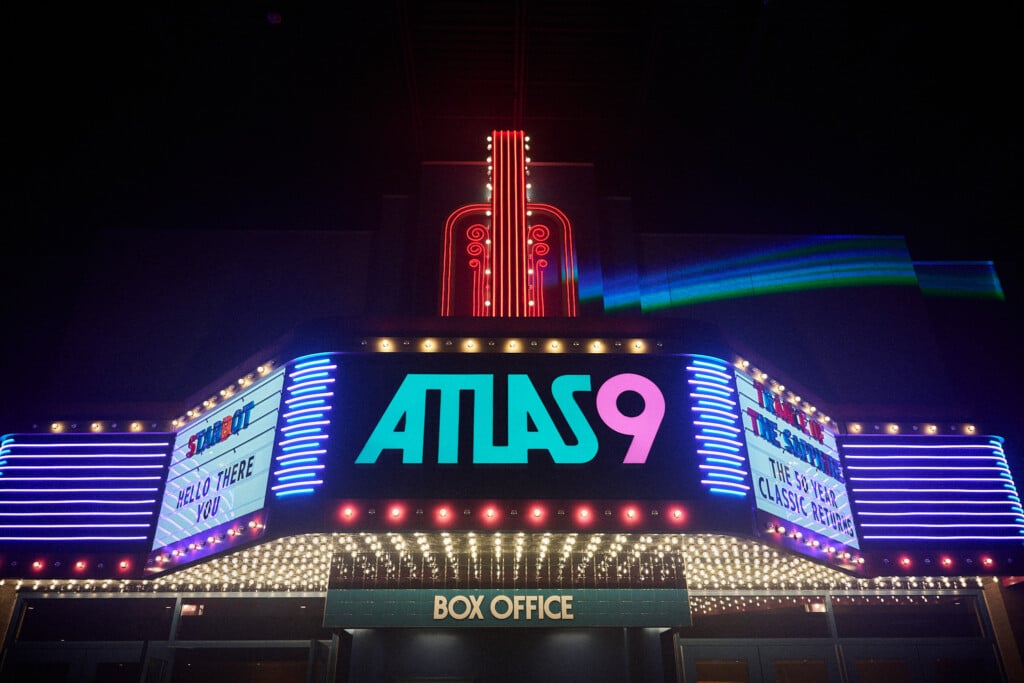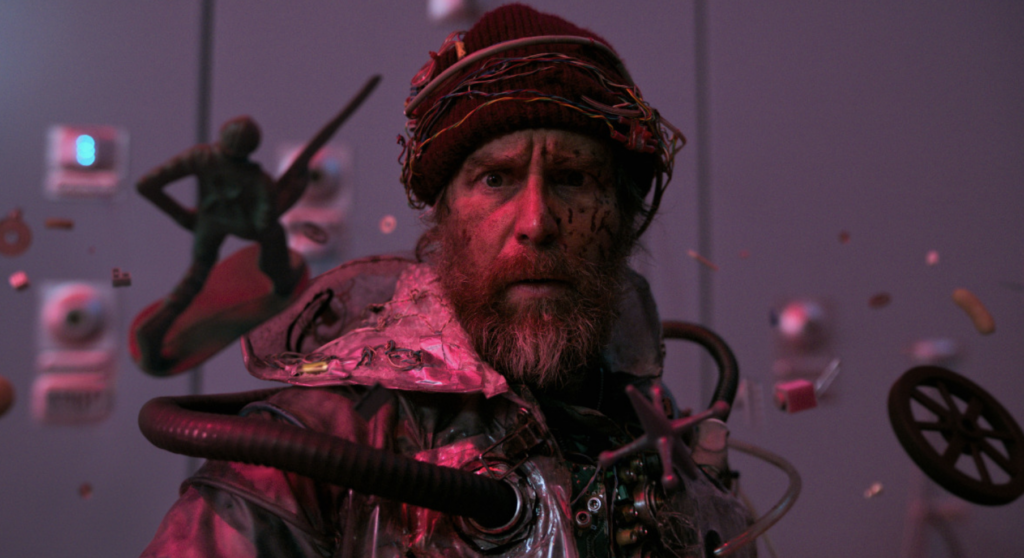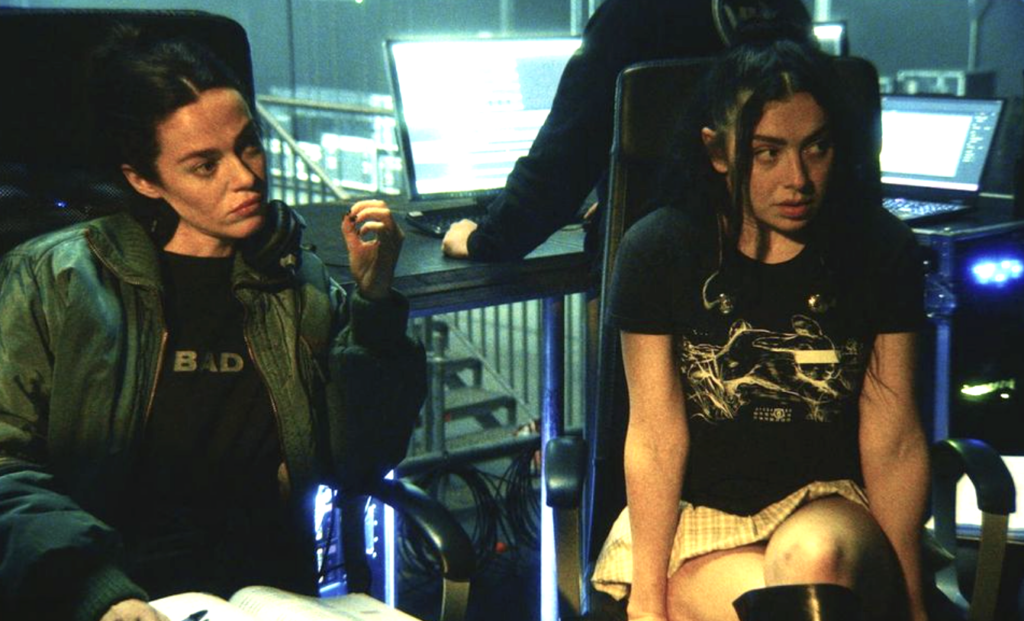Abby Olcese’s essay collection Films for All Seasons syncs cinematic blockbusters and deep-cuts to explorations of belief
What’s your favorite Christmas movie? Easter movie? Pentecost movie? Casual viewers and movie buffs alike have favorite movies to watch at certain times of the year. But for film critic Abby Olcese, movies with spiritual themes aren’t just limited to the holiday season. As our Film Editor at The Pitch, we can attest to that firsthand. The way she’ll program a weekend movie marathon for us is always stitched together with narrative throughlines, and she’ll take any opportunity to cross-examine “belief” in whatever form it takes.
One of the things that rarely influences the film reviews here at The Pitch—but most certainly does so at other outlets—is Olcese’s writing on faith—Christianity through a modern, progressive lens. For years we’ve heard about the mini-film fests she will put together for a church group or her parents’ friends. In fact, we’ll probably never shake the second-hand experience of hearing her explain the concept of “magical realism” to a non-cinephile crowd, to explain some highfalutin cinema choices.
It doesn’t come as a surprise that this would finally find mass appeal in a long-form book. In Films for All Seasons: Experiencing the Church Year at the Movies, Olcese invites us to reflect on the great themes of the church calendar through the lens of film. From superhero movies and Star Wars to classics and arthouse films, she chooses movies for each liturgical season and leads us through them with skill and infectious enthusiasm, exploring how each one can inform and deepen appreciation of its corresponding season. Most importantly, it’s a book dedicated to positing questions to the readerand discussion topics for groups—that push the individual to engage more honestly and personally with each of the films explored.
In a time of film criticism often steamrolling opinions of those who don’t fall in line, it seems pertinent to imbue the discussion with, y’know, actual discussion.
Tomorrow night, Olcese holds a launch party at LFK’s The Raven Bookstore, and on Wednesday night, you can find her doing a Q&A with a book signing at Flagship Books in KCK. We chatted quickly with Olcese ahead of the book’s release about the nature of belief and the flicker of faith—along with the cinematic essays she didn’t expect to include.
The Pitch: You’ve got an entire book of essays about the intersection between God and Hollywood. Isn’t that a rare intersection to find these days? How do you pitch Fast & Furious 6 as a means to better understand Jesus Christ?
Abby Olcese: It may seem rare, but I’m lucky to be part of a community that’s trying to change that. I write for a number of magazines and websites, some of which, like Sojourners or Think Christian, are specifically trying to bridge the gap between secular art and the church. There are a lot of great writers out there who do what I do, but I think we’re all in some way responding to a church culture that wasn’t giving us the kinds of conversations we craved when we were growing up and starting to engage with popular culture ourselves.
In some ways, that conversation is a little more open now than it used to be. If you’re looking for other people doing this work, I can recommend Josh Larsen, Alissa Wilkinson, Justin Chang, Tyler Huckabee, Elijah Davidson and so many others! That’s just scratching the surface. 
To bring it back to the second half of that question, I think when you grow up going to church and hearing certain stories over and over again, and hopefully as you mature in your faith you’re looking for new ways to engage those ideas, you notice when they pop up other places. It’s kind of like seeing an actor you find interesting, and then recognizing them when they’re in something else. It’s like that for me with films.
In the book, for instance, I mention going to a Maundy Thursday service (part of Holy Week that observes the Last Supper and Jesus’ arrest) in high school and suddenly being reminded of the end of The Fellowship of the Ring, because both those stories end on a note of tragedy and uncertainty, but neither are the actual end of the narrative they’re telling.
Fast and Furious 6 is kind of a stretch from that, I suppose, but I don’t see it that way! This book started as a series of articles for Think Christian during the pandemic, with suggestions for readers to watch at home or with family when they couldn’t go to church for services. I was researching an article about Pentecost, which is a weird one because it comes up in church, but isn’t often explored — like a lot of people, I didn’t really know what it meant. It comes from a story in Acts after Jesus leaves the disciples. Tongues of fire come down from Heaven during a religious festival, and all of a sudden everyone gathered can hear the disciples talking about Jesus in their own language, even though they came from all over.
As I was researching, I realized that Pentecost is a way to think about diversity and the church — like where we fit in a universal, international sense, but also how we can recognize and celebrate the diversity of our own church communities. In that sense, Fast and Furious 6 works perfectly, because beyond sick car races, they’re also a celebration of diverse found family, and that movie in particular explores that concept a little more deeply than the others.
In your work at Sojourners, you’ve often written film and TV reviews for a Christian audience that are, let’s say, more left-leaning and progressive than folks might expect from a religious publication. You’re pitching cinema to an audience that might normally dismiss something like Dick Johnson is Dead based on concept. What’s the secret to getting audiences to open up to something that feels outside of their comfort zone?
Some people are going to find fault with anything, which is a bummer. They don’t have to read this book, but they’ll be missing out! In general, I think it starts for me by trying to find the nugget of truth in a story that people can identify with no matter who they are. Dick Johnson is Dead, for example, is about a filmmaker whose father is declining from Alzheimer’s Disease, and to help make the most of the time they have together, they collaborate on a series of scenes that depict his death. It’s a dark joke, but it’s also specific to the sense of humor the two of them share. Most of us have some older person in our life who’s died, like a relative or a mentor, and the movie is very honest about how preparing for that experience feels, or even how it feels to know that it’s something you’ll have to do eventually. 
From that point on, it becomes about the artist’s perspective. What choices did they make? Why did they make those choices? How did the results make you feel? It’s also important to remember that your own reaction is yours, it’s not necessarily authoritative. The person sitting next to you is going to have a different experience watching something than you did, and it’s worth asking them how they feel or what they think (granted, you should probably know them a little, this doesn’t work that well with total strangers).
One example I had of this was at the True/False film festival in Columbia, Missouri a couple of years ago. I went with friends, and the mother of one of them, who also came along. The last film we saw at the festival was The Stroll, which is a documentary about a community of transwomen sex workers who worked in NYC’s meatpacking district in the 80s. It’s a really emotional film, a lot of the people featured had been homeless during that time, and their lives were very hard. I know my friend’s mom is a little more conservative than I am, so I wasn’t sure how she was going to react. When we left, I asked cautiously what she’d thought, and she was teary. She told me “No one should have to live like that,” meaning the difficulty of the lives of the women in the film. Not judgmental, just a statement of fact that their lives were hard and should have been easier. I think that’s a great goal to shoot for. You don’t have to change people’s minds profoundly, just help them recognize that there are experiences all of us can understand.
Of all the films that made the cut in your book, what’s the essay that you could’ve written a few thousand more words on? What did you have to rein in to keep it from being its own, separate book?
My essay on The Last Temptation of Christ went a little longer than some of the others in the book, mostly because it has such a fraught history with Christians, and probably could’ve been even longer. The movie came out in 1988, so some of that controversy has faded a little, but not so much that people weren’t raising their eyebrows again in 2016 during the release of Martin Scorsese’s Silence, which is an adaptation of a novel that a lot of evangelical folks love.
Of course, I get why Last Temptation is controversial—the Nikos Kazantzakis novel and the movie contain a lot of “what if” ideas about the crucifixion that suggest Christ sometimes doubted, that he was afraid, and that he had desires that made him susceptible to temptation. However, there’s absolutely room for doubt and curiosity and exploration in Christianity. It should be encouraged! And it’s not like a couple of atheist heathens made this movie; Scorsese is a lifelong Catholic who considered becoming a priest! Paul Schrader was an Episcopalian at the time he wrote the film! I think it’s a prime example of the kind of art that gets quickly written off by people of faith as one thing, but deserves to be considered in its own context.
That’s a roundabout way of saying I could’ve written so much more about Last Temptation, partly because there’s so much to say about the controversy surrounding it before you get to the meat of the movie itself, which is equally fascinating, if not more so.
It’s rare in 2024 to encounter a collection of film reviews or essays that seems less interested in over-explaining an opinion or plowing through trivia, but instead wants to ask questions of the reader—and ask them to ask others as well. It seems like a harder thing to write a book that asks someone to engage deeply, sincerely, and honestly with themselves. Is that too much homework?
You’re right in that I think social media has conditioned us to expect spoon-feeding of quick-hit explainers and “authoritative” opinions. But while that might help you process something quickly, it’s not going to help you develop the tools to do that stuff on your own. Good culture writing doesn’t give you the answers so much as it allows you to enter another person’s brain as they’re processing their own reaction to what they’ve just seen, to give you one perspective on either what your experience with something might be, or how to consider something after you’ve seen it.
Personally, I love processing my reactions to films with friends after the fact, either in the theater, getting a drink afterward, or on a group text. Those conversations lead to incredible places, and they wouldn’t happen if I didn’t come out with questions. We don’t often get to have conversations like that anymore. Sometimes we don’t feel like interrogating our emotions. Other times we don’t have patience for other people as they’re interrogating theirs. More often, I think we’re watching more stuff at home, so the post-viewing conversation may not even happen.
In my experience, this is also true with a lot of contemporary Christianity. I wasn’t raised that way, but as I got older and started encountering more of the world outside my home, I found more and more that people came to church for certainty. That can be dangerous, because certainty — particularly if someone’s trying to sell you on it as a concept — can come with a lot of rules about who or what is allowed, and what isn’t. Jesus didn’t teach people to do that. He taught us to ask questions about people in power, especially when vulnerable people are being excluded (please note that I don’t mean rich white men who feel they’re being censored, I mean people whose lives are actually devalued or in danger).
So yeah, there’s some homework in there, but it’s homework that’s long overdue (I know you know I meant that pun).
But seriously, what do you hope people will get from engaging as a group with these films? Is there a type of experience you want to craft? A vision for what you hope comes from this?
I think people will have a couple of different kinds of experiences, based on the movies I’ve gathered in this book. One is giving people a framework to watch something they’re familiar with in a new way — Groundhog Day, for instance, or The Last Jedi or Guardians of the Galaxy. The other is to use that as a back door to get people to watch movies they either aren’t familiar with at all, or they might not normally watch — Bad Times at the El Royale, A Hidden Life, Lucky, or even Last Temptation.
Overall, I want to invite people toward curiosity, and to encourage that kind of discussion that we don’t have as much anymore, or might need prompting in order to make happen. If you come in and work your way through the films in this book, my hope is that you run into some stuff you haven’t seen before, that makes you ask questions and starts your own cinematic journey. That’s how it started for me, and it’s something I feel like we’re in danger of losing.
One of the films featured in this tome is James Cameron’s Avatar. I’ve heard this wasn’t the original plan. What happened there, and do you feel good telling more people to watch the blue-people flick?
You’re right — I hadn’t originally planned to include Avatar, which ended up in the section on Ascension Day, the time in the church calendar that observes the resurrected Jesus’ return to God the Father, and his commissioning of his disciples to continue his ministry. The suggestion to put it in actually came from my friend Sarah Welch-Larson (author of the excellent book Becoming Alien). I don’t think I’d seen Avatar in over a decade, so I decided to revisit it, and of course, she was right! I’ve long been pretty ambivalent to that franchise because I didn’t think it had much to offer beyond groundbreaking visuals, but there’s actually a lot of interesting spiritual content there about renewal and spiritual transcendence, how we seek it, and how we find it. I’ll let people read the full essay to figure out how that all fits together, but it was one of those times that I was pleasantly surprised by what I found!
Finally, do you think the same themes and ideas will be useful to explore for the non-religious reader? Is the concept of faith and humanity alive and well in modern Hollywood, despite what Joker 2 would have me believe?
One of the movies I discuss in the book is Charles Laughton’s The Night of the Hunter. It’s an example to me of both what Christianity often looks like to people outside of it (or people who have been hurt by it) and what Christianity is supposed to be, but isn’t often publicly seen as. Robert Mitchum plays a murderous preacher who kills women, but is never caught because he’s such a convincing man of God — loud, well-versed in church speak, judgmental — that nobody would think to accuse him. Lillian Gish’s character is a kind, tough woman who fosters kids and loves them unconditionally, but because she never calls attention to herself (and because she’s an old woman) nobody sees the importance of what she does for other people.
I have a lot of friends who aren’t religious, and based on the version of Christianity that’s most widely seen, I can’t say I blame them. The church is full of people like Robert Mitchum’s Harry Powell. So is our government. However, the church is also full of people like Lillian Gish’s Rachel Cooper, people who actually live out the teachings of Jesus by being selfless, inclusive and kind, and who can see right through the hypocrisy that drives the Harry Powells of the world. I’ve been lucky enough to be around more Rachels than Harrys in my life, but I know that’s not true for a lot of people.
All that is to say, my ultimate goal for this book is twofold. On one hand, I want to invite readers who are already going to church to open their minds a little both artistically and philosophically, to be willing to consider other perspectives and art that might make them a little uncomfortable. On the other, I really hope this is interesting for people who aren’t Christians, but like thinking about good stories, and are curious about what faith can look like. I want to show people that belief doesn’t have to look a specific way, and that there’s a sense of unity to be found in considering the questions we’re asking about the world and each other.
Films for All Seasons: Experiencing the Church Year at the Movies is available now.







